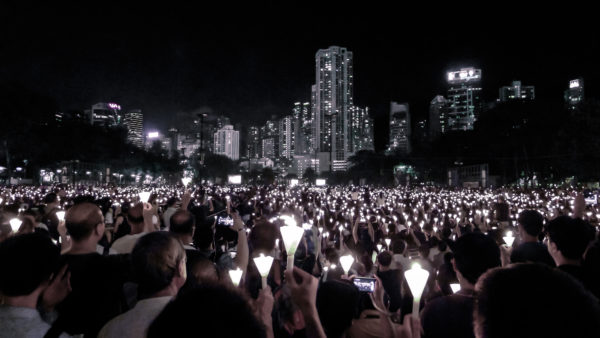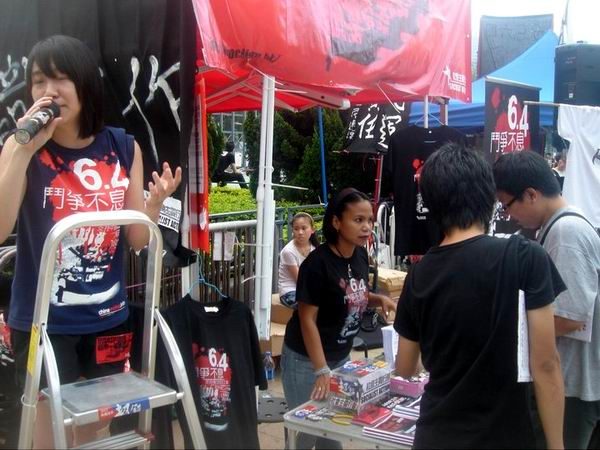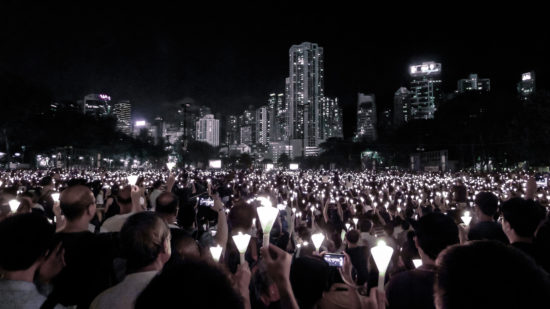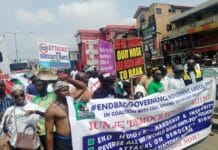Decision is not ‘radical’ but a further step backwards from mass anti-government struggle
Dikang, Socialist Action in Hong Kong
The Hong Kong Federation of Students has officially withdrawn from the group that organises the annual Hong Kong (Victoria Park) vigil to mark the 1989 Beijing massacre on 4 June. While this is not unexpected, it’s a bad decision – it is sectarian and a step backwards, not forwards. The Federation has also withdrawn from the Civic Rights Front, the main organiser of Hong Kong’s annual 1 July ‘7.1’ demonstration.
Socialist Action has many criticisms of the Alliance in Support of Patriotic Democratic Movements in China, which hosts the 4 June vigil. The Alliance has deliberately de-politicised the vigil and cut the link between the 1989 movement and today’s struggles. Many youth criticise the annual torchlight ceremony as just a ritual.
The Alliance has always been run as a closed top-down group, with no effort to open up and involve other forces in a truly democratic way. This reflects the dominance of the moderate pan-democrats who, if the truth be told, have long given up the belief that it is possible to fight and defeat the Chinese dictatorship (CCP). Socialists don’t agree. We believe the Chinese regime has in fact entered an extremely troubled period – economically and politically – and this is paradoxically why it is lashing out with increased ‘white terror’ against striking workers, lawyers and NGOs, and this year has even exported this terror through a series of illegal foreign abductions.
Mass character
What signal does the Federation of Students send with this decision? It is a negative one of course, not least because the Federation was one of the founding groups behind the Alliance and because students played an important role in the 1989 struggle. Actually, the pan-democratic leaders and the Alliance have exaggerated the role of the students. The impression they give is that the 1989 struggle was only a student movement, when in truth the workers and masses of Beijing and other cities increasingly took over the movement that the students initiated. This was what most alarmed the dictatorship all those years ago.
The decision of the Federation of Students to withdraw support does nothing to correct or change the political deficiencies of the Alliance. The main factor that makes the annual Victoria Park vigil an important event is its mass character. In recent years, 150,000 to 200,000 have gathered. The important thing is the place that the 1989 movement occupies in the consciousness of the masses in Hong Kong (and in recent years up to 20,000 participants from across the border). This makes the vigil an important platform for today’s struggle against the dictatorship, despite the increasingly diluted and sentimentalised message of its organising committee.
What are the student leaders proposing instead? They criticise – and we agree – that the vigil has largely been reduced to a ritual. But their alternative is to organise separate university-based gatherings, which will have a similar ritualistic character – just smaller and more fragmented. How is that a step forward? There is nothing new in this, nothing that marks an escalation or an injection of ‘real struggle’ into 4 June. All the Federation of Students is offering is smaller rituals! The new policy is therefore a sectarian policy. Sectarianism is promoting the narrow interests of a small group – in this case the right-wing nativist student leaders – at the expense of the wider interests of the masses.

Demonstrations not enough
The decision reflects the recent shift of direction in Hong Kong’s student movement, with a layer of nativist activists taking control of all eight of the city’s student unions and unseating the old leadership that was closer to the pan-democrats. Four student unions remain inside the Federation, the others split away, but they are all dominated by the right-wing nativists.
The nativists present themselves as a ‘radical’ alternative to the ‘weak’ pan-democrats, but their ‘radicalism’ is based on mostly empty gestures with no real content. The decision to switch to ‘smaller rituals’ on 4 June is an example of this method. It is a step backwards from the standpoint of real struggle to change the system.
Many youth, and not only youth, are frustrated over the ineffectiveness of the struggle methods and strategy (i.e. the lack of) that has been offered by the pan-democratic leaders. “We’ve tried marching and demonstrations, but they don’t work,” is an increasingly common view. But this conclusion is one-sided and therefore wrong. Marches and demonstrations are needed; they are absolutely critical elements in the struggle to gather, organise and educate a mass force to overthrow a dictatorial system. All revolutions begin with marches and demonstrations. But by themselves a demonstration or even several demonstrations are not enough.
The problem with Hong Kong’s long history of mass democracy marches is that the pan-democratic leaders who dominate the movement have always wanted to limit them to one-off events and disperse the masses as quickly as possible. These marches have never been linked to a serious strategy of escalating action to bring down the government and change the system. For this to work, the working class needs to be organised in strong democratic trade unions with a political force – a workers’ party – at its head. The mission is to carry out a revolution against the current dictatorial system and this must of course go beyond marches and demonstrations, even very big ones such as Hong Kong has experienced in recent years.
The methods of the workers’ movement, tested over more than a century and a half, of strikes, mass action, blockades, general strikes and an appeal to the state (the police) to join forces with the people against the regime – these are what are needed to bring down an undemocratic regime. Not least, the power of the capitalist tycoons who stand fully behind CCP rule, must also be broken through socialist policies and public ownership in order to create a pension system, affordable housing, good jobs and higher wages.
“Priority to the Hong Kong struggle”
The reactionary effect of the gains by right-wing nativists in the student sphere is clearly shown in their rejection of the Alliance stand on “building a democratic China”. The Federation of Students says it no longer supports this idea, because “priority” should be given to the Hong Kong struggle.
This invents a completely fake ‘contradiction’ – as if supporting democracy in China in any way negatively impacts on the democracy struggle in Hong Kong. The opposite is true. By the same twisted logic, action against global warming or for world peace would also contradict and undermine Hong Kong’s struggle for democracy. To not support democracy in China means at the very best to take a position of ‘neutrality’ in the face of the CCP’s white terror, arrests and abductions. The absurdity of this position is shown by the call of several nativist groups that people should not protest CCP Standing Committee member Zhang Dejiang’s upcoming visit to the city because, “it has nothing to do with Hong Kong”.
The message this gives to the masses in China is, “we don’t care” how many are arrested, abducted, tortured, or sacked from their jobs. Equally bad, the message this gives to Hong Kong people is that the existence and continuation of the world’s biggest and wealthiest dictatorship is “not important” for the Hong Kong struggle – a fatal miscalculation! Ironically, the nativists and the pan-democrats who they denounce so severely have the same “ostrich attitude” – to think Hong Kong can achieve democracy on its own.
This is to turn away from the only force that can actually defeat the CCP dictatorship – the multimillion working class of China. Only the CCP dictatorship gains from these political ideas that aim to fragment the struggle, reduce it to its smallest and weakest parts, and serve up empty ‘radical’ gestures as a substitute for a serious strategy to overthrow the regime. It is high time for those who want to rebuild a genuine mass democratic struggle to call time on the nativists’ reactionary pseudo-radical gestures!





